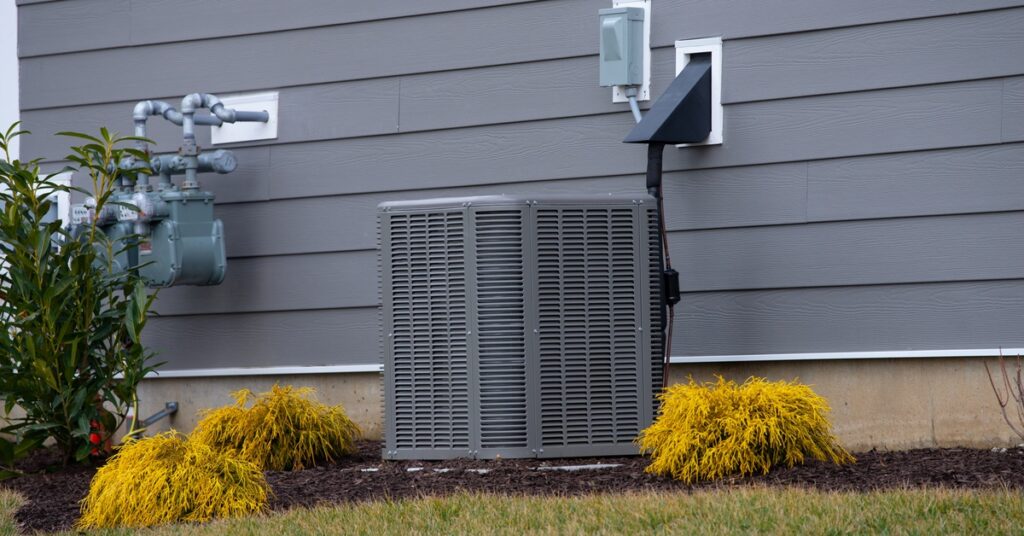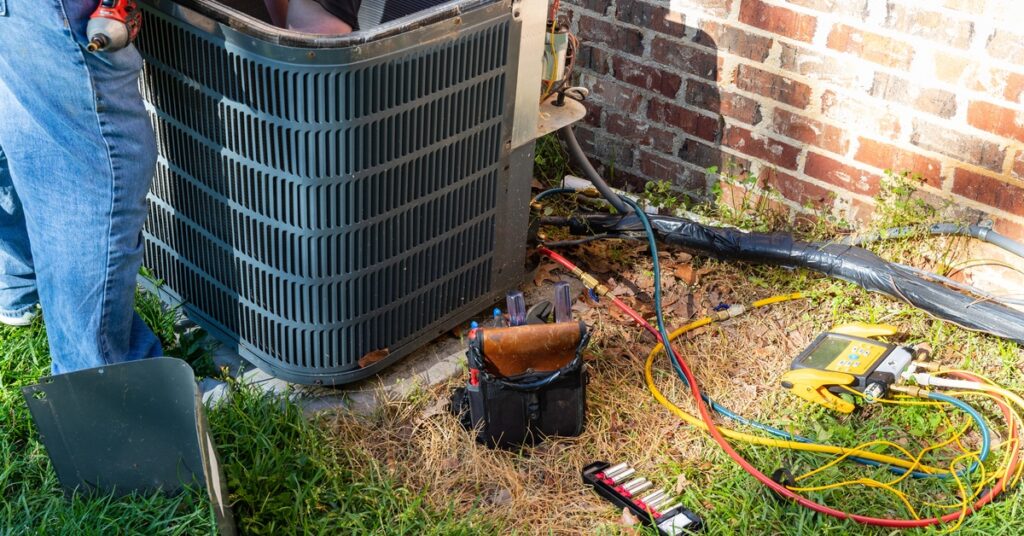
Your HVAC system is a big investment, so you’ll likely want to protect it year-round. This can leave many homeowners wondering whether they should cover their air conditioning unit or leave it to face the elements. Understanding both perspectives helps you make an informed decision that protects your investment and ensures optimal performance. Read on to find out whether to cover your AC in winter.
Reasons People Cover Their AC
While most experts don’t recommend covering your AC unit, some homeowners still choose to do so. They believe it protects against debris, weathering, and harsh winter conditions, ultimately prolonging the unit’s lifespan and saving them money.
Protects Against Debris
Falling leaves, twigs, dirt, and other outdoor debris can accumulate around the condenser coils, restricting airflow. If this issue goes unchecked before you restart the system in spring, it will have to work harder. When the unit overworks, it strains the components, making it more likely to break down. By using a mesh cover or top-only cover, you create a barrier between the outdoor environment and your unit, reducing the risk of debris buildup.
Prevents Damage from Snow, Ice, and Freezing Rain
Snow and ice aren’t concerns in Texas or Florida, but they are a primary reason many homeowners in northern states cover their AC units. Heavy snow can put pressure on the unit’s top panel and internal components. At the same time, ice may form around electrical connections, creating safety hazards and damaging sensitive parts as it expands and contracts.
In colder climates, covers serve as a barrier against direct exposure to snow, ice, and freezing rain. Made from durable, weather-resistant fabric, they help prevent snow from piling up and reduce the risk of freeze-thaw damage, protecting the unit’s structural integrity.
Reasons Not to Cover Your AC Unit

Covering your AC system can be beneficial in some areas across the country; however, it can also damage the unit, especially in warmer climates. Some of the reasons to avoid covering your air conditioner in winter include:
Manufacturers Design AC Units for Most Weather
Manufacturers make modern AC systems to face the elements with little to no struggle, meaning winter weather. For instance, aluminum condenser coils naturally resist corrosion, while powder-coated steel cabinets provide excellent protection against rust and environmental damage. Moreover, internal components receive factory-applied protective coatings that shield them against moisture, salt, and other corrosive elements commonly encountered during the winter months.
Pro Tip
Since companies design AC units to withstand winter conditions, most manufacturers explicitly advise against covering their units: it could interfere with or damage ventilation systems.
Covering Can Trap Moisture
Placing a cover over an air conditioner can trap moisture, especially if you use a cover made with non-breathable materials such as vinyl, since it creates a sealed environment. When moisture becomes trapped inside a covered unit, it cannot evaporate naturally, leading to prolonged contact with metal components. This extended moisture exposure accelerates rust formation and creates ideal conditions for mold and mildew growth.
Moreover, condensation can form inside the unit as winter ends and temperatures begin to increase. This trapped moisture creates a greenhouse effect that maintains high humidity levels around sensitive electrical components, resulting in corrosion and electrical damage.
Covers Can Restrict Airflow
Air conditioning systems require unrestricted airflow around condenser coils for proper operation and component longevity. Covers remaining on during accidental system startup can severely damage compressors. Even with systems off, some units cycle for maintenance or frost protection. Covers restricting airflow interfere with these cycles, potentially voiding warranties or causing component failures.
Tight-fitting covers may also trap heat generated by electrical components that remain energized during winter months. This heat buildup can damage sensitive electronics and create conditions that promote premature component failure when the system restarts in spring.
It May Attract Pests
Covers create enclosed, protected spaces that attract pests. The dark, confined environment beneath a cover draws rodents, insects, and other creatures looking for safe nesting spots. Insects and animals often cause more damage than the weather that the cover should protect against. Rodents may even gnaw through covers to reach the insulated space underneath, damaging both the cover and possibly the air conditioning unit.
Deciding What to Do
When deciding whether or not to cover your AC in winter, the most important things to consider are your local climate and manufacturer recommendations. Most HVAC professionals advise against covering your air conditioner, especially in warmer regions, because it can trap moisture and lead to mold or mildew growth.
In Florida and Texas, winters are mild, and snow or ice is almost nonexistent. Due to this, using a cover in these areas can actually do more harm than good. Covers can hold in moisture from rain or humidity, which increases the risk of rust, corrosion, and even encourages pests to make a home inside your unit.
Tips for Taking Care of Your System is Key

Keeping your AC unit in top shape is the best way to ensure it serves you well for years, no matter where you live. A few simple habits and some professional help go a long way in preventing breakdowns, maximizing efficiency, and extending equipment lifespan.
Routine Cleaning and Monthly Tasks
Leaves and debris can collect around your outdoor unit and clog the system, making it work harder and reducing its efficiency. Take a few minutes each month to clear away leaves, grass clippings, twigs, and any other debris from around the AC. This keeps airflow unobstructed and prevents unnecessary strain on the unit. You should also check for and remove any overgrown vegetation or shrubs, giving the unit at least two feet of clearance on all sides.
Seasonal and Annual Professional Maintenance
At least once a year—ideally in the fall before winter hits—schedule a thorough inspection and tune-up with a certified AC contractor. Professionals do more than just a basic cleaning: they check refrigerant levels, clean coils and fins, tighten electrical connections, lubricate moving parts, and test the system’s operation. During preventive inspections, they can also catch small problems before they become costly repairs.
Pro Tip
Semi-annual checkups, conducted in the spring and fall, enable technicians to weatherproof electrical components, apply anti-corrosion treatments, and verify that drainage systems are functioning correctly. This makes the unit more resilient to seasonal changes, all without limiting airflow like a cover would.
Proactive Care Adds Up
Regular maintenance prevents unexpected breakdowns and improves your air conditioner’s energy efficiency, reducing utility bills. By addressing issues promptly, you also avoid the risks associated with covering your AC, such as moisture buildup or pest infestation. Taking these simple steps protects your investment and gives you peace of mind, knowing your system is ready to handle the demands of each season year after year.
Contact Style Crest
Protecting and maintaining your AC system is essential for long-term performance, and Style Crest is here to help. With over 50 years of expertise, we offer reliable installation, repair, and maintenance services tailored to your specific needs. Our experts can help you select the ideal system for your home, provide regular maintenance to keep it running smoothly, and promptly address any issues that may arise. Contact us today to schedule a consultation or service appointment so your AC is ready for whatever the weather brings.